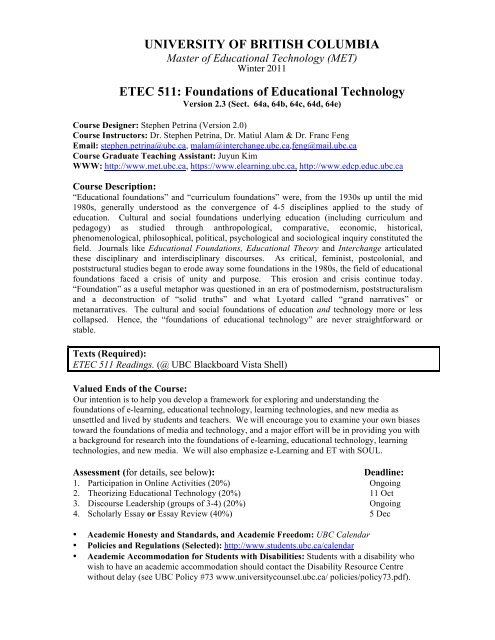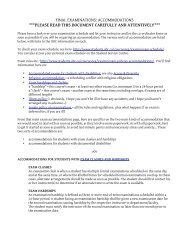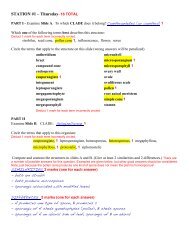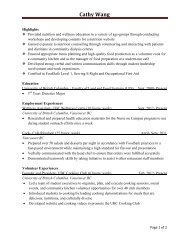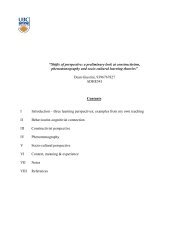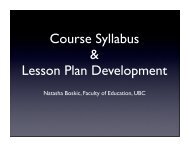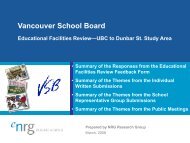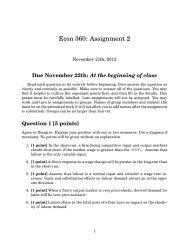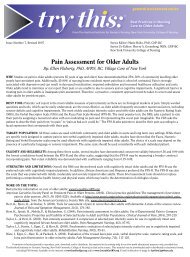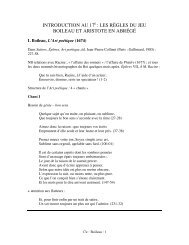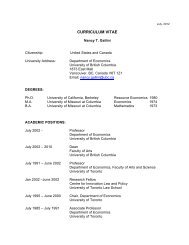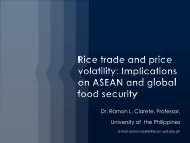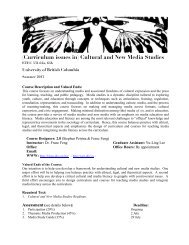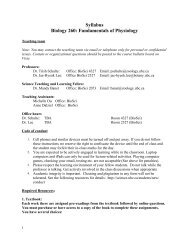ETEC 511 Syllabus (2011) - UBC Blogs - University of British ...
ETEC 511 Syllabus (2011) - UBC Blogs - University of British ...
ETEC 511 Syllabus (2011) - UBC Blogs - University of British ...
You also want an ePaper? Increase the reach of your titles
YUMPU automatically turns print PDFs into web optimized ePapers that Google loves.
UNIVERSITY OF BRITISH COLUMBIA<br />
Master <strong>of</strong> Educational Technology (MET)<br />
Winter <strong>2011</strong><br />
<strong>ETEC</strong> <strong>511</strong>: Foundations <strong>of</strong> Educational Technology<br />
Version 2.3 (Sect. 64a, 64b, 64c, 64d, 64e)<br />
Course Designer: Stephen Petrina (Version 2.0)<br />
Course Instructors: Dr. Stephen Petrina, Dr. Matiul Alam & Dr. Franc Feng<br />
Email: stephen.petrina@ubc.ca, malam@interchange.ubc.ca,feng@mail.ubc.ca<br />
Course Graduate Teaching Assistant: Juyun Kim<br />
WWW: http://www.met.ubc.ca, https://www.elearning.ubc.ca, http://www.edcp.educ.ubc.ca<br />
Course Description:<br />
“Educational foundations” and “curriculum foundations” were, from the 1930s up until the mid<br />
1980s, generally understood as the convergence <strong>of</strong> 4-5 disciplines applied to the study <strong>of</strong><br />
education. Cultural and social foundations underlying education (including curriculum and<br />
pedagogy) as studied through anthropological, comparative, economic, historical,<br />
phenomenological, philosophical, political, psychological and sociological inquiry constituted the<br />
field. Journals like Educational Foundations, Educational Theory and Interchange articulated<br />
these disciplinary and interdisciplinary discourses. As critical, feminist, postcolonial, and<br />
poststructural studies began to erode away some foundations in the 1980s, the field <strong>of</strong> educational<br />
foundations faced a crisis <strong>of</strong> unity and purpose. This erosion and crisis continue today.<br />
“Foundation” as a useful metaphor was questioned in an era <strong>of</strong> postmodernism, poststructuralism<br />
and a deconstruction <strong>of</strong> “solid truths” and what Lyotard called “grand narratives” or<br />
metanarratives. The cultural and social foundations <strong>of</strong> education and technology more or less<br />
collapsed. Hence, the “foundations <strong>of</strong> educational technology” are never straightforward or<br />
stable.<br />
Texts (Required):<br />
<strong>ETEC</strong> <strong>511</strong> Readings. (@ <strong>UBC</strong> Blackboard Vista Shell)<br />
Valued Ends <strong>of</strong> the Course:<br />
Our intention is to help you develop a framework for exploring and understanding the<br />
foundations <strong>of</strong> e-learning, educational technology, learning technologies, and new media as<br />
unsettled and lived by students and teachers. We will encourage you to examine your own biases<br />
toward the foundations <strong>of</strong> media and technology, and a major effort will be in providing you with<br />
a background for research into the foundations <strong>of</strong> e-learning, educational technology, learning<br />
technologies, and new media. We will also emphasize e-Learning and ET with SOUL.<br />
Assessment (for details, see below):<br />
Deadline:<br />
1. Participation in Online Activities (20%) Ongoing<br />
2. Theorizing Educational Technology (20%) 11 Oct<br />
3. Discourse Leadership (groups <strong>of</strong> 3-4) (20%) Ongoing<br />
4. Scholarly Essay or Essay Review (40%) 5 Dec<br />
• Academic Honesty and Standards, and Academic Freedom: <strong>UBC</strong> Calendar<br />
• Policies and Regulations (Selected): http://www.students.ubc.ca/calendar<br />
• Academic Accommodation for Students with Disabilities: Students with a disability who<br />
wish to have an academic accommodation should contact the Disability Resource Centre<br />
without delay (see <strong>UBC</strong> Policy #73 www.universitycounsel.ubc.ca/ policies/policy73.pdf).
Grading Guidelines<br />
Approved July 2008<br />
A level - Good to Excellent Work<br />
A+ (90-100%) A very high level <strong>of</strong> quality throughout every aspect <strong>of</strong> the work. It shows the individual (or group) has<br />
gone well beyond what has been provided and has extended the usual ways <strong>of</strong> thinking and/or performing. Outstanding<br />
comprehension <strong>of</strong> subject matter and use <strong>of</strong> existing literature and research. Consistently integrates critical and creative<br />
perspectives in relation to the subject material. The work shows a very high degree <strong>of</strong> engagement with the topic.<br />
A<br />
(85-89%) Generally a high quality throughout the work. No problems <strong>of</strong> any significance, and evidence <strong>of</strong> attention<br />
given to each and every detail. Very good comprehension <strong>of</strong> subject and use <strong>of</strong> existing literature and research. For the<br />
most part, integrates critical and creative perspectives in relation to the subject material. Shows a high degree <strong>of</strong><br />
engagement with the topic.<br />
A- (80-84%) Generally a good quality throughout the work. A few problems <strong>of</strong> minor significance. Good comprehension<br />
<strong>of</strong> subject matter and use <strong>of</strong> existing literature and research. Work demonstrates an ability to integrate critical and<br />
creative perspectives on most occasions. The work demonstrates a reasonable degree <strong>of</strong> engagement with the topic.<br />
B level - Adequate Work<br />
B+ (76-79%) Some aspects <strong>of</strong> good quality to the work. Some problems <strong>of</strong> minor significance. There are examples <strong>of</strong><br />
integrating critical and creative perspectives in relation to the subject material. A degree <strong>of</strong> engagement with the topic.<br />
B<br />
(72-75%) Adequate quality. A number <strong>of</strong> problems <strong>of</strong> some significance. Difficulty evident in the comprehension <strong>of</strong><br />
the subject material and use <strong>of</strong> existing literature and research. Only a few examples <strong>of</strong> integrating critical and creative<br />
perspectives in relation to the subject material. Some engagement with the topic.<br />
B- (68-71%) Barely adequate work at the graduate level.<br />
NOTE: For <strong>UBC</strong>’s Faculty <strong>of</strong> Graduate Studies (FOGS), a final mark below 68% for Doctoral students and below 60%<br />
for Masters students is the equivalent <strong>of</strong> a Failing mark.<br />
C & D level - Seriously Flawed Work<br />
C<br />
(55-67%) Serious flaws in understanding <strong>of</strong> the subject material. Minimal integration <strong>of</strong> critical and creative<br />
perspectives in relation to the subject material. Inadequate engagement with the topic. Inadequate work at the graduate<br />
level.<br />
D level<br />
D (50-54%)<br />
F level - Failing Work<br />
F (0-49%)<br />
2
<strong>ETEC</strong> <strong>511</strong> Course Schedule & Readings:<br />
Each module generally consists <strong>of</strong> activities, readings, chat and discussion. Readings for each<br />
module include a balance <strong>of</strong> activities, <strong>of</strong>ten supplemented by image and sound resources.<br />
Date Module Assignments Live Forum Themes & Topics<br />
Week 1<br />
6-10 Sept<br />
#1 Course &<br />
WebCT Intro<br />
Course introduction,<br />
Online connections,<br />
Mapping & Definitions<br />
Week 2<br />
11-17 Sept<br />
#2 Vancouver Time<br />
TBA<br />
Philosophy <strong>of</strong> Educational<br />
Technology<br />
Technical-Empirical Dimensions <strong>of</strong> Educational Technology<br />
Week 3<br />
18-24 Sept<br />
#3 Vancouver Time<br />
TBA<br />
Design <strong>of</strong> Educational<br />
Technology<br />
Week 4<br />
25 Sept-1 Oct<br />
#4 Vancouver Time<br />
TBA<br />
Ethics & Jurisprudence <strong>of</strong><br />
Educational Technology<br />
Ethical-Personal & Socio-Political Dimensions <strong>of</strong> Educational Technology<br />
Week 5<br />
2-8 Oct<br />
#5 Vancouver Time<br />
TBA<br />
Anthropology & Sociology<br />
<strong>of</strong> Educational Technology<br />
Week 6<br />
9-15 Oct<br />
#6 Theorizing ET<br />
due<br />
Vancouver Time<br />
TBA<br />
History <strong>of</strong> Educational<br />
Technology<br />
Week 7<br />
16-22 Oct<br />
#7 Vancouver Time<br />
TBA<br />
(Week 8) 23-29 Oct Reading Break<br />
Politics <strong>of</strong> Educational<br />
Technology<br />
Week 9<br />
30 Oct-5 Nov<br />
#8 Essay Proposal<br />
Due<br />
Vancouver Time<br />
TBA<br />
Psychology &<br />
Phenomenology <strong>of</strong><br />
Educational Technology<br />
Week 10<br />
6-12 Nov<br />
Week 11<br />
13-19 Nov<br />
Week 12<br />
20-26 Nov<br />
Week 13<br />
27 Nov-3 Dec<br />
#9 Vancouver Time<br />
TBA<br />
Economics <strong>of</strong> Educational<br />
Technology<br />
Ecological-Natural Dimensions <strong>of</strong> Educational Technology<br />
#10 Vancouver Time<br />
TBA<br />
Ecology <strong>of</strong> Educational<br />
Technology<br />
Existential-Spiritual Dimensions <strong>of</strong> Educational Technology<br />
#11 Vancouver Time<br />
TBA<br />
Spirituality <strong>of</strong> Educational<br />
Technology<br />
(Week 13) Scholarly Essays & Essay Reviews<br />
-<br />
Scholarly Essay<br />
Course Feedback<br />
Due<br />
3
Module 1<br />
Introduction / The Definition <strong>of</strong> Educational Technology:<br />
Grand and not so Grand Narratives<br />
Readings / Media:<br />
1. Januszewski, A. (2001). Educational technology: The development <strong>of</strong> a concept. Englewood,<br />
CO: Libraries Unlimited.<br />
2. Dorbolo, J. (2004). Review <strong>of</strong> Educational technology: The development <strong>of</strong> a concept. Ethics<br />
and Information Technology, 5(1), 68-70. Library Portal Access.<br />
3. Loh, C. S. (2007). A suitable textbook for the classroom. However… Review <strong>of</strong> the SAGE<br />
handbook <strong>of</strong> e-learning research. Educational Researcher, 36(9), 573-578. Library Portal<br />
Access. See also http://www.odlqc.org.uk/n19-e.htm.<br />
4. Scanlon, I. (2002). Educational technology: The influence <strong>of</strong> theory. Journal <strong>of</strong> Interactive<br />
Media in Education, 6, 1-19. Library Portal Access.<br />
5. Petrina, S. & Feng, F. (2008). Primer for defining and theorizing technology in education, pt.<br />
1. Vancouver, BC: Tech no-Printing Press. See module 1.<br />
Module 2<br />
The Philosophy <strong>of</strong> Educational Technology:<br />
Philosophical Foundations<br />
Readings / Media<br />
1. Knowlton, E. (1992). The hand and the hammer: A brief critique <strong>of</strong> the overhead projector.<br />
Feminist Teacher, 6(2), 21-23, 41. Library Portal Access.<br />
2. Adams, C. (2008). The poetics <strong>of</strong> PowerPoint. Explorations in Media Ecology, 7(4), 283–<br />
289. Library Portal Access.<br />
3. Tufte, E. R. (2003, September). PowerPoint is evil. Wired, 11(9).<br />
4. Heidegger, M. (1953/1977). The question concerning technology. In M. Heidegger, The<br />
question concerning technology and other essays (trans. W. Lovitt) (pp. 3-35). New York:<br />
Harper & Row.<br />
Technical-Empirical Dimensions <strong>of</strong> Educational Technology<br />
Module 3<br />
The Design <strong>of</strong> Educational Technology:<br />
Curriculum and Instructional Design Foundations<br />
Readings / Media<br />
1. Mayer, R. A. (2003). Elements <strong>of</strong> a science <strong>of</strong> e-learning. Journal <strong>of</strong> Educational Computing<br />
Research, 29(3), 297-313. Library Portal Access.<br />
2. Kozma, R. B. (1994). Will media influence learning? Reframing the debate. Educational<br />
Technology Research and Development, 42(2), 7-19. Library Portal Access.<br />
3. Clark, R. E. (1994). Media will never influence learning. Educational Technology Research<br />
and Development, 42(2), 21-29. Library Portal Access.<br />
Module 4<br />
The Ethics & Jurisprudence <strong>of</strong> Educational Technology:<br />
Legal Foundations<br />
Readings / Media<br />
1. Philip, K. (2005). What is a technological author? The pirate function and intellectual<br />
property. Postcolonial Studies, 8(2), 199-218. Library Portal Access.<br />
4
Ethical-Personal & Socio-Political Dimensions <strong>of</strong> Educational Technology<br />
Module 5<br />
The Anthropology & Sociology <strong>of</strong> Educational Technology:<br />
Cultural and Social Foundations<br />
Readings / Media<br />
1. Monahan, T. (2005). Technological cultures. In Globalization, technological change and<br />
public education (pp. 73-92). New York: Routledge.<br />
2. Petrina, S. (2007). What is culture? Vancouver, BC: Tech no-Printing Press. See module 5<br />
(read only as reference).<br />
Module 6<br />
The History <strong>of</strong> Educational Technology:<br />
Historical Foundations<br />
Readings / Media<br />
1. Paul, R. (Executive Producer) & Petrina, S. (2002, October 11). The magic box: Technology<br />
in education (Sound Recording). Washington, D.C.: National Public Radio, Sound Prints. See<br />
module 6.<br />
2. McLuhan, M. (1967). The medium is the message. NEA Journal, 56(7), 24-27.<br />
3. Moody, K. (1999). The children <strong>of</strong> Telstar. New York: Vantage.<br />
Module 7<br />
The Politics & Political Economy <strong>of</strong> Educational Technology:<br />
Political Foundations<br />
Readings / Media<br />
1. Haraway, D. (1985). A manifesto for cyborgs. Socialist Review, 15(2), 65-107.<br />
Module 8<br />
The Psychology & Phenomenology <strong>of</strong> Educational Technology:<br />
Psychological & Phenomenological Foundations<br />
Readings / Media<br />
1. Turkle, S. (2004). Whither psychoanalysis in computer culture. Psychoanalytic Psychology,<br />
21(1), 16-30. Library Portal Access.<br />
2. Dall’Alba, G. & Barnacle, R. (2005). Embodied knowing in online environments.<br />
Educational Philosophy and Theory, 37(5), 719-744. Library Portal Access.<br />
Module 9<br />
The Economics <strong>of</strong> Educational Technology:<br />
Economic Foundations<br />
Readings / Media<br />
1. Puryear, J. M. (1999, September). The economics <strong>of</strong> educational technology.<br />
TechKnowLogia, 46-49.<br />
2. Lerner, J. & Triole, J. (2002). Some simple economics <strong>of</strong> open source. Journal <strong>of</strong> Industrial<br />
Economics, 50(2), 197-234. Library Portal Access.<br />
5
Ecological-Natural Dimensions <strong>of</strong> Educational Technology<br />
Module 10<br />
The Ecology <strong>of</strong> Educational Technology:<br />
Ecological Foundations<br />
Readings / Media<br />
1. Merchant, C. (2002). A conversation with Carolyn Merchant. California Monthly, 112(6).<br />
Library Portal Access.<br />
2. Zhao, Y. & Frank, K. (2003). Factors affecting technology uses in schools: An ecological<br />
perspective. American Educational Research Journal, 40(4), 807-840. Library Portal<br />
Access.<br />
Existential-Spiritual Dimensions <strong>of</strong> Educational Technology<br />
Module 11<br />
The Spirituality <strong>of</strong> Educational Technology:<br />
Spiritual Foundations<br />
Readings / Media<br />
1. Davis, E. (1993). Techgnosis: Magic, memory, and the angels <strong>of</strong> information. South Atlantic<br />
Quarterly, 92(4), 585-616. Library Portal Access.<br />
2. Feng, F. & Petrina, S. (2010). The flesh is willing but the spirit is weak. Unpublished<br />
manuscript. Introduction to Technology, Religion, Spirituality and the Sacred. See module<br />
11.<br />
Participation & Assignments<br />
Participation:<br />
Participation is valued at 20% <strong>of</strong> your final grade. We refer to the scholarly level <strong>of</strong> participation<br />
as academic conversation, which entails a variety <strong>of</strong> things including academic conversation,<br />
articulation and presentation. Participation is interdependent with preparation for each module,<br />
which involves reading (highlighting, pagination post-its, margin notes, comments & questions,<br />
etc.), writing (posting to discussions, note-taking, outlining, questioning, defining, mapping,<br />
framing, summarizing, journaling, blogging, podcasting, exposition, etc.), organizing<br />
(documenting, labeling, ordering, archiving, filing, sequencing events, chronicling, etc.),<br />
reflecting (rethinking, reincorporating, remapping, analyzing, synthesizing, etc.), and speaking<br />
(podcasting, corresponding with peers, chat, etc.). One goal <strong>of</strong> preparation is to sustain<br />
increasingly sophisticated academic conversations or engagement with the readings, course and<br />
peers. A second goal is to develop systematic approaches for engaging with the readings and<br />
your peers (i.e., developing reading, speaking, writing, organizing, and reflection form(at)s and<br />
styles that are effective). Read for Meaning along with Purpose…<br />
6
Participation<br />
Low------------Avg------------High<br />
Appropriately and accurately articulates key constructs and themes in readings, etc.<br />
1---------------3---------------5<br />
Reveals an attempt to synthesize knowledge <strong>of</strong> media and technology in education<br />
(readings, etc.).<br />
1---------------5.5--------------10<br />
Advances collective knowledge and consciousness by engaging with authors, peers,<br />
instructors in the online course<br />
1---------------3---------------5<br />
Total: xx / 20<br />
Assignments<br />
2. Theorizing Educational Technology (20%)— Theorize an application / app, artifact, device,<br />
technique, or process related to ET. Ideally, this would be the same or closely related to the topic<br />
chosen for the scholarly essay (see below). For help on the process <strong>of</strong> theorizing consult the<br />
Writing Guide for Graduate Students and read closely the way that Knowlton (1992) theorizes the<br />
overhead projector and how Adams (2008) and Tufte (2003; 2006) analyze PowerPoint. Modes<br />
<strong>of</strong> theory include comedy and tragedy, critique and deconstruction, myth and irony, or<br />
combinations. Hence, theory does not always reduce to critique and criticism.<br />
Include one toon / image (i.e., at least one ‘cell’) with the essay. Cartooning and spo<strong>of</strong>ing have<br />
always been a tradition or foundation <strong>of</strong> ET. For example, the Educational Technology Magazine<br />
ran a longstanding series <strong>of</strong> comics through the 1960s and 1970s and collated these in The<br />
Educational Technology Cartoon Book. Applications such as Comic Life, Toonlet (toonlet.com),<br />
and Pixton (pixton.com/ca/) make tooning ET not only possible but expected and essential. *See<br />
the images that accompany Knowlton (1992) and Tufte (2003; 2006).<br />
This essay should include a definition, explanation, development and details and, if applicable,<br />
examples. This is a common “pyramid structure” used in many encyclopedias. In the opening<br />
paragraph, the first few sentences clearly describe and define the topic and explain its importance<br />
to educational technology, e-learning, instructional design, etc.<br />
Keep the essay as jargon-free as possible. View this from a perspective <strong>of</strong> preparing a speech<br />
rather than writing an essay. In this way, we can describe complex issues in thoughtful ways<br />
without being needlessly complicated. Use direct quotations from other works sparingly but<br />
include citations <strong>of</strong> publications (e.g., APA citations, etc): If you must quote, please limit to one<br />
or two sentences or so and acknowledge the source (APA style). Focus on the topic and avoid<br />
digressions. Every word is important.<br />
Theorizing ET Essay Length: 700 words (e.g., 2 pages single-spaced + toon / image) (input into<br />
the Media Library and submit a note indicating completion to the Assignment Dropbox *with a<br />
MS Word or pdf file attached). Please be sure that your entry meets but does not exceed this<br />
word count. Word counts include the topic, your name, title, and references.<br />
7
Theorizing Educational Technology<br />
Low------------Avg------------High<br />
Clarity <strong>of</strong> Communication / Grammar / Style<br />
1---------------5.5---------------10<br />
Depth, Comprehensiveness & Substance <strong>of</strong> Theory & Toon<br />
1---------------5.5---------------10<br />
Total: xx / 20<br />
3. Scholarly Essay (40%)— Choose a topic that corresponds with one <strong>of</strong> the weekly topics (i.e.,<br />
foundations) or themes and write a scholarly paper exploring media and technology in education<br />
(i.e., apps, artifacts, devices, problems, processes, trends, etc.). The essay should provide a clear,<br />
cogent, concise exploration or case study <strong>of</strong> the topic (e.g., topics within or about e-learning,<br />
educational technology, learning technologies, ICT, new media, instructional design, curriculum<br />
design, etc.). Take a position (state a thesis or argument) and provide evidence, through examples<br />
and narrative, to support the position. Be creative and choose a topic that really interests you!<br />
At the 2/3-point <strong>of</strong> the course (Monday following the break), please also submit a *one page<br />
outline* <strong>of</strong> your paper as a work in progress. Outline = outline form. This includes the:<br />
1. Topic<br />
2. Theme and argument<br />
a. The argument or thesis<br />
b. The background<br />
3. Primary and Secondary sources for insight into the topic<br />
a. Issues to be addressed<br />
b. Literature to be consulted<br />
4. Provisional conclusions drawn from the argument & issues or data<br />
5. Structure / sections <strong>of</strong> the paper, etc.<br />
Assessment: (Limit to 10-12, tight well-written double-spaced pages including title page<br />
(limit to 3000 words + references) (upload to Assignment Dropbox and link to e-Portfolio).<br />
1. Clarity <strong>of</strong> communication / writing<br />
a. Is the writing clear and concise?<br />
b. Are the ideas focused and organized?<br />
2. Development <strong>of</strong> argument / thesis<br />
a. Is the argument coherent? Thoughtful? Analytical? Critical?<br />
Sophisticated?<br />
3. Exploration <strong>of</strong> content and theory<br />
a. Is there evidence <strong>of</strong> critically and theoretically exploring the issues?<br />
b. Are the ideas theorized, synthesized, extended or applied?<br />
4. Examples<br />
a. Are examples sufficient? Do examples ground the paper?<br />
b. Are there narrative examples?<br />
5. Grammar & Style<br />
a. Organization, sentence structure, paragraphs, spelling<br />
b. APA Style (format, references)<br />
8
Scholarly Essay<br />
Low------------Avg------------High<br />
Clarity <strong>of</strong> communication/writing<br />
1---------------5.5--------------10<br />
Development <strong>of</strong> argument / thesis<br />
1---------------3--------------5<br />
Exploration <strong>of</strong> content and theory<br />
1---------------5.5--------------10<br />
Provision <strong>of</strong> effective and sufficient examples<br />
1----------------5.5---------------10<br />
Total: xx / 40<br />
Grammar & Style<br />
1----------------3---------------5<br />
or Essay Review (40%)— Choose a topic that corresponds with one <strong>of</strong> the weekly topics (i.e.,<br />
Jurisprudence <strong>of</strong> ET) or themes and write an essay review exploring the foundations <strong>of</strong> ET.<br />
Drawing on 7 - 10 carefully selected and relevant research articles or a smaller number <strong>of</strong><br />
books (2 - 3), write a critical essay review on a topic within or about ET, ID, e-Learning, new<br />
media, etc. Establish the purpose for your review and the approach you will use in the<br />
introduction. Provide enough <strong>of</strong> a summary <strong>of</strong> each source (article, book, etc.) so that the<br />
readings are understandable to a general reader <strong>of</strong> your essay. The purpose <strong>of</strong> your review should<br />
establish the basis <strong>of</strong> your analysis / synthesis. You may choose to critique the articles and texts<br />
based on some <strong>of</strong> the assigned course readings. Strive for clarity and conciseness in your writing<br />
by trying to keep your audience in mind.<br />
At the 2/3-point <strong>of</strong> the course (following the break), please also submit a *one page outline*<br />
<strong>of</strong> your paper as a work in progress. Outline = outline form (see details above).<br />
Assessment: (Limit to 10-12, tight well-written double-spaced pages including title page<br />
(limit to 3000 words + references) (upload to Assignment Dropbox and link to e-Portfolio).<br />
1. Overview / Introduction <strong>of</strong> subject, theories and issues involved<br />
• Type <strong>of</strong> essay review (theory, methodology, policy, quantitative research,<br />
qualitative research, etc.)<br />
• Scope: what type <strong>of</strong> resources are best?<br />
• Search for information: wide enough and narrow enough<br />
2. Categories selected as natural divides <strong>of</strong> thesis and reviewed sources<br />
• Sources organized around the research question or thesis<br />
• Areas <strong>of</strong> controversy or debate included<br />
3. Analysis and interpretation <strong>of</strong> overarching similarities and variances <strong>of</strong> ideas: Include<br />
• Provenance: credentials, evidence<br />
• Objectivity: authors’ point <strong>of</strong> view and representation <strong>of</strong> other views<br />
• Persuasiveness: which theses are most convincing v least?<br />
• Value: Does this work contribute in a significant way to understanding the<br />
subject?<br />
4. Summation or conclusions <strong>of</strong> thesis generating idea in context with materials reviewed<br />
• What is known and not known<br />
• Areas <strong>of</strong> further research<br />
• Relevant, appropriate and, useful<br />
5. Grammar & Style<br />
9
• Organization, sentence structure, paragraphs, spelling<br />
• APA Style (format, references)<br />
Essay Review<br />
Low------------Avg------------High<br />
Overview / Introduction <strong>of</strong> subject, theories and issues involved<br />
1---------------5.5--------------10<br />
Categories selected as natural divides <strong>of</strong> thesis and reviewed material<br />
1---------------3--------------5<br />
Analysis and interpretation <strong>of</strong> overarching similarities and variances <strong>of</strong> ideas<br />
1---------------5.5--------------10<br />
Summation or conclusions <strong>of</strong> thesis generating idea in context with materials reviewed<br />
1----------------5.5---------------10<br />
Total: xx / 40<br />
Grammar & Style<br />
1---------------3---------------5<br />
4. Discourse Leadership (20%)— Choose one week and topic on the schedule to coordinate the<br />
module. It will be your responsibility to clearly re/present the topic and reading(s), and to<br />
coordinate the discussions. Please use the approach indicated below. Format: Group Project—<br />
groups <strong>of</strong> 4. For the discussion that you lead, please prepare to:<br />
1. Outline the readings (primary and secondary sources) and post this outline to the group.<br />
2. Provide a brief overview <strong>of</strong> the readings based on the outline.<br />
3. Define key terms or methodological and theoretical concepts that are challenging.<br />
4. Design handouts, discussion questions and presentation media for clarifying the readings.<br />
5. Design activities for the group with attention to inclusive participation. Possible activities<br />
include:<br />
• Discussion focus questions and moderation <strong>of</strong> discussion forums<br />
• Chat / Live Forums or Live Classroom<br />
• Wiki / Interactive Web / Prezi<br />
• Voice & Podcast, etc.<br />
6. Moderate and bring closure to the topic for the week.<br />
*After completion, please upload note indicating completion to the Assignment Dropbox.<br />
Discourse Leadership<br />
Low------------Avg------------High<br />
Addresses key concept(s) in readings<br />
1---------------5.5----------------10<br />
Sufficient examples from readings are provided & synthesizes with previous readings<br />
1---------------3----------------5<br />
Total: xx / 20<br />
Communication and media are pr<strong>of</strong>essional in format—<br />
Style is clean and coherent<br />
1---------------3----------------5<br />
10
1. American Journal <strong>of</strong> Distance Education, The<br />
2. Asynchronous Learning Networks Magazine<br />
(electronic) (see also Journal <strong>of</strong> ALN)<br />
3. Australian Journal <strong>of</strong> Educational Technology<br />
4. <strong>British</strong> Journal <strong>of</strong> Educational Technology<br />
5. Canadian Journal <strong>of</strong> Learning Technology<br />
6. Canadian <strong>of</strong> Science, Math and Technology<br />
Education<br />
7. College & <strong>University</strong> Media Review: A Look at<br />
Practices, Trends, & Research<br />
8. Computers & Education<br />
9. Computers and Composition<br />
10. Computers in Human Behavior<br />
11. Computers in Libraries<br />
12. Contemporary Issues in Technology & Teacher<br />
Education (electronic)<br />
13. Currents in Electronic Literacy<br />
14. Education and Information Technologies<br />
15. Educational Media International<br />
16. Educational Technology Magazine<br />
17. Educational Technology Research and<br />
Development<br />
18. Educational Technology Review<br />
19. Educational Technology Review (electronic)<br />
20. EDUCAUSE Quarterly<br />
21. EDUCAUSE Review<br />
22. Electronic Journal for the Integration <strong>of</strong><br />
Technology in Education<br />
23. Human-Computer Interaction: A Journal <strong>of</strong><br />
Theoretical, Empirical, & Methodological Issues <strong>of</strong><br />
User Science and <strong>of</strong> System Design<br />
24. Information Society, The: An International Journal<br />
25. Information Technology in Childhood Education<br />
Annual<br />
26. Information Technology and Disability<br />
27. Information Technology, Education and Society<br />
28. Innovations in Education & Teaching International<br />
29. Instructional Science<br />
30. Interactive Multimedia Electronic Journal <strong>of</strong><br />
Computer-Enhanced Learning (electronic)<br />
31. International Journal <strong>of</strong> AI in Education<br />
32. International Journal <strong>of</strong> Technology and Design<br />
Education<br />
33. International Journal <strong>of</strong> Educational Technology<br />
34. International Journal <strong>of</strong> Instructional Media<br />
35. International Journal on E-Learning<br />
36. International Review <strong>of</strong> Research in Open and<br />
Distance Education<br />
37. Internet and Higher Education, The<br />
38. Internet TESL Journal, The(electronic)<br />
39. Journal <strong>of</strong> Asynchronous Learning Networks<br />
(electronic) (see also ALN Magazine)<br />
40. Journal <strong>of</strong> Computer Assisted Learning<br />
Journals in Technology and Education<br />
41. Journal <strong>of</strong> Computer Based Instruction<br />
42. Interpersonal Computing and Technology<br />
Journal (electronic)<br />
43. IT Journal Online<br />
44. Journal <strong>of</strong> Computing in Higher Education<br />
45. Journal <strong>of</strong> Computing Research<br />
46. Journal <strong>of</strong> Distance Education<br />
47. Journal <strong>of</strong> Educational Computing Research<br />
48. Journal <strong>of</strong> Educational Media<br />
49. Journal <strong>of</strong> Educational Multimedia and<br />
Hypermedia<br />
50. Journal <strong>of</strong> Educational Technology Systems<br />
51. Journal <strong>of</strong> IT Education<br />
52. Journal <strong>of</strong> Information Technology for Teacher<br />
Education<br />
53. Journal <strong>of</strong> Interactive Learning Research<br />
54. Journal <strong>of</strong> Interactive Media in Education<br />
(electronic)<br />
55. Interactive Multimedia Electronic Journal <strong>of</strong><br />
Computer-Enhanced Learning<br />
56. JOE: The Journal <strong>of</strong> Online Education<br />
57. Journal <strong>of</strong> Research on Computing in Education<br />
58. Journal <strong>of</strong> Science and Educational Technology<br />
59. Journal <strong>of</strong> Special Education Technology<br />
60. Journal <strong>of</strong> Technology and Teacher Education<br />
61. Journal <strong>of</strong> Technology Education<br />
62. Journal <strong>of</strong> Technology Studies<br />
63. Learning & Leading with Technology<br />
64. Learning Environments Research<br />
65. Learning With Technology<br />
66. Learning Technology<br />
67. Mathematics and Computer Education<br />
68. Media and Methods<br />
69. Meridian: A Middle School Computer<br />
Technologies Journal<br />
70. MultiMedia Schools<br />
71. New Review <strong>of</strong> Hypermedia and Multimedia<br />
72. Online Chronicle <strong>of</strong> Distance Education &<br />
Communication<br />
73. Open Learning: The Journal <strong>of</strong> Open & Distance<br />
Learning<br />
74. Quarterly Review <strong>of</strong> Distance Education, The<br />
75. <strong>Syllabus</strong><br />
76. T.H.E. Journal<br />
77. Teaching English with Technology: A Journal for<br />
Teachers <strong>of</strong> English (electronic)<br />
78. Technology and Children<br />
79. Technology & Learning<br />
80. Technology, Pedagogy and Education<br />
81. Technos<br />
82. TechTrends<br />
83. THEN: Technology, Humanities, Education &<br />
Narrative<br />
84. WebNet Journal<br />
11


